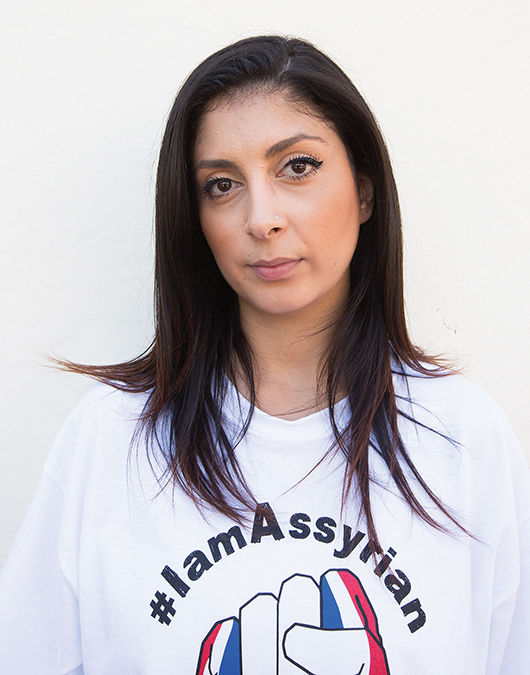A day after U.S. warplanes dropped a barrage of bombs to help Iraqi and Kurdish ground troops take back Iraq’s largest dam near Mosul, some 500 Assyrian Christian supporters marched on Los Angeles’ busiest streets and freeway overpasses — from Union Station to City Hall — shouting “Stop ISIS Now!” while waving the white, blue and red Assyrian flag.
Leaders of the moving demonstration Aug. 18 said the limited air strikes weren’t enough to stop the genocide of their religious brothers and sisters in the Middle East, and, moreover, have displaced many Christians.
“The bombings have helped to kind of stop as much as possible the ISIS terrorist group,” said Sandra Assaker, 27, who lives in Hollywood and is a member of i am Assyrian. The group organized the march along with Demand for Action, a worldwide grassroots movement that’s sprung up across 50 cities and a dozen countries.
“But the bombings have definitely caused more scattering and displacement of people in Iraq. They’re also damaging the entire country. So right now they have no place to come home to. And we are still on the brink of extinction.”
Chorbishop George Bet-Rasho of St. Mary Assyrian Church in Tarzana, who marched with other religious leaders, agreed that the bombings have slowed down the aggression of ISIS.
“But we’ve already lost many of our villages outside of Mosul,” he said walking up Temple Street. “And by the time the United States acted, many have already lost family members, have lost their houses, have lost everything they had. So for us in the U.S. to act whenever we feel like acting is not enough for the person who’s suffering there on the ground right now.
“What do you tell the man I heard about who committed suicide because his wife and daughter were raped and killed in front of his eyes? ‘We’re coming soon.’ You have to put yourself in their shoes to understand how they’re feeling. There’s still so much suffering, it’s unbelievable.”
Walking alongside the chorbishop was Father Athanasis Toma of the Ancient Church of the East. “We’re out here basically in support of our people, mostly Persian people of Iraq and all the minorities suffering the genocide that’s ongoing — and the world is turning its face the other way,” he said. “We just want to bring awareness to the world that our brothers and sisters in Iraq are being killed, and they’re being persecuted for their religion, their faith.”
When asked why the Obama Administration and the media have focused so much on the persecution of the Yazidi religious sect, which traces its roots to Zoroastrianism, he observed, “I guess the world hates Christianity. Unfortunately, Christ himself said they like darkness more than light. Basically, Christianity tells the truth, and the rest of the world hates the truth.”
“And I think this whole thing is a calculated process of trying to get rid of the Christians from the entire Middle East,” he maintained. “Absolutely! I think it’s a much wider purpose than just ISIS. It’s a calculated thing. Syria’s doing the same thing, persecuting Christians and burning down their churches. All of these people are fearing for their lives.”
ISIS — the Sunni extremist group formerly known as the Islamic State of Iraq and Syria but now calls itself simply the Islamic State — recently warned that if the air strikes continue it will attack the United States. The bombings carried out by U.S. aircrafts and drones began in early August when thousands of Yazidis were trapped on a mountain range in northern Iraq.
But tens of thousands of indigenous Christians, including Assyrian and Chaldean Catholics, were also targeted for systematic destruction and given the choice: convert to Islam, pay a hefty tax, leave the country or be killed, often by beheading. Christians have managed to survive in the Muslim-dominated region for nearly 2,000 years.
Last week a Los Angeles Times article reported that Christian towns and villages had been totally overrun by ISIS, with perhaps 100,000 fleeing to the semi-autonomous Kurdish zone.
A number of marchers stressed how the current crisis in Iraq was just the latest in a horrific history of attempts to wipe Assyrians from the face of the earth, beginning with the 1895 Massacre of Diyarbekir where an estimated 55,000 Assyrians were killed.
This, in turn, paved the way for the Assyrian Genocide of World War I, where some 750,000 people were slaughtered in the Ottoman Empire, followed by death marches in 1924 from Turkey to Aleppo Syria and the Semele Massacre in Iraq claiming 3,000 lives. More recently, there were reported multiple attacks on Assyrians during the two Gulf Wars.
“Our persecution started way before all this,” said Chorbishop Bet-Rasho. “We’ve been persecuted in Baghdad with church bombings for 10 years now and many times before that. So the only way this will be settled is if we get international protection, a safe haven in the Nineveh plains, our ancestral homeland, where we can have our own police force under the United Nations, for instance. Because nothing else will give us the assurance that there won’t be another massacre next year or the year after that. We just need a little piece of property where we can live in peace among ourselves.”
Walking back to his car from the march, Father Alexei Smith, pastor of St. Andrew Russian Greek Catholic Church and administrator of St. Paul Melkite Greek Catholic Mission, both in El Segundo, told The Tidings, “I learned a long time ago that in times of persecution there are no Orthodox, Protestants or Catholics. We’re brothers and sisters in Christ, and we must stand together.
“Cardinal José Cox Huneeus, prefect for the Pontifical Counsel for Promoting Christian Unity, talks about an ‘ecumenism of blood,’” he pointed out. “And that’s what we’re experiencing now with the Assyrian people in Iraq. And that’s why we have to stand together and say, ‘We’re not going to permit this genocide.”

